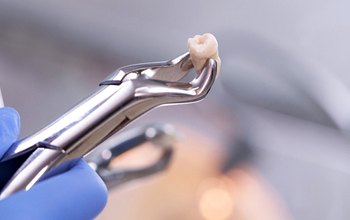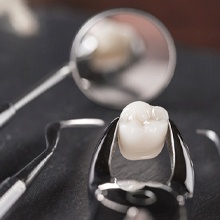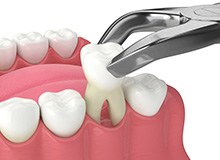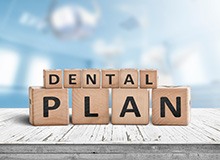Tooth Extractions – Westfield, NJ
Doing What’s Necessary to Protect Your Smile

While missing teeth can be replaced, Dr. Weinman will always recommend keeping your natural teeth whenever possible. To that end, we offer a variety of restorative services to renew damaged, decayed, and worn down teeth. However, some teeth simply cannot be saved, leaving a tooth extraction in Westfield as your best option for protecting the rest of your mouth. Call us today to set up a consultation and learn more about the extraction process and how our team will help you through it.
Reasons Why Tooth Extractions Are Necessary

Tooth extractions are reserved for very specific circumstances, and they are only ever recommended as a last resort. When we tell you that a tooth has to be removed, it is only after we have taken the time to consider other options and determined that they are not viable. Indications for a tooth extraction include:
- A decayed tooth that does not respond to root canal therapy
- Trauma that has destroyed too much of the existing enamel for the tooth to be repaired
- A certain tooth is preventing the rest of the smile from making the necessary movements during orthodontic treatment
- A tooth is impacted, completely unable to erupt
The Process of Removing a Tooth

Teeth are removed in one of two ways: pulling them or surgically extracting them. Pulling a tooth is also known as a simple extraction, and it can only be performed if the tooth in question has fully emerged from the gum line. We numb the area around the tooth, then use a clasping tool to shift it back and forth, eventually causing it to break free. In cases where surgery is required, we make an incision in the gums to reveal as much of the tooth as possible. Additional steps may need to be taken depending on the circumstances. For example, we might have to break the tooth into smaller sections in order to remove it safely. Rest assured that each step of the procedure will be planned very carefully for the sake of your oral health.
Tooth Extraction Aftercare

For the next few days after a tooth extraction, you’ll need to protect the extraction site until it has fully healed. A blood clot will form over the wound; it’s important to protect this blood clot until new tissue has formed. Otherwise, you could experience a painful dry socket or suffer an infection. Furthermore, you’ll likely experience some discomfort after the numbness in your mouth has worn off.
We will create a pain management plan for you that utilizes prescription and over-the-counter medication as needed. We’ll also give you instructions for practicing good oral hygiene during the recovery period, such as brushing without disturbing the blood clot. You’ll need to eat soft foods while your mouth heals, and we can give you some suggestions to help you plan your meals.
The discomfort and swelling associated with a tooth extraction should fade over time. Call us right away if the pain grows worse, if you experience sensitivity near the surgical site, or if there’s bleeding that doesn’t stop after two days.
Understanding the Cost of Tooth Extractions

As with any dental procedure, you’ll want to make sure that you’re able to fit the cost of a tooth extraction into your budget. We can give you an estimate of the overall cost during an initial consultation, but in the meantime, it’s a good idea to learn as much as possible about the many factors that might influence the financial aspect of your care. You should also make sure you’re familiar with your payment options so that you can start planning ahead.
Factors That Can Affect Tooth Extraction Cost

The tooth extraction process can look very different for each patient based on their needs. Consequently, the cost of the procedure is not set in stone. Below is a closer look at some of the variables that can affect the amount you end up paying:
- The type of tooth and where it’s located in your mouth can make a difference. For example, extracting the molars near the back of your mouth is a more complex procedure that generally carries a higher price tag.
- The number of teeth needs to be taken into account. A patient who only needs to have one tooth removed will typically pay less than a patient who has multiple teeth that are in need of extraction.
- The type of extraction performed will directly impact the cost. A simple extraction will usually cost less than one that requires surgery.
- If you choose to replace the tooth that was extracted, you will need to consider the cost of the kind of replacement you get. Dental bridges, dentures, and dental implants all have different prices attached.
Does Dental Insurance Cover Tooth Extractions?

Since tooth extractions are viewed as necessary in terms of protecting oral health, they are typically covered by dental insurance. The exact level of coverage the procedure receives can vary, but you can often expect it to be around 50%; this is because a tooth extraction is considered to be a major dental treatment.
That said, because every dental plan is different, you should double-check your benefits to make sure that you have an accurate idea of what is and isn’t covered. You should also familiarize yourself with factors that might affect the amount that your dental insurance company is willing to pay; for example, you will generally need to meet your deductible for the year before your benefits kick in.
How to Make Tooth Extractions Affordable

If you do not have dental insurance and are worried about your ability to pay for a tooth extraction, you may want to consider applying for CareCredit financing. CareCredit lets you choose from one of several payment plans that have low to no interest. Paying the cost of your care a little bit at a time can make things much easier on your bank account. Talk to our team if you would like more information about CareCredit.
Tooth Extraction FAQs

We understand that having a tooth removed can be stressful, but that’s why our team will be by your side every step of the way to help. To make sure you’re as comfortable as possible going forward, we’ll answer any questions you have about tooth extractions and what to expect before, during, and after the procedure. Below are the answers to a few questions that we tend to hear from a lot of patients; give us a call if there’s anything else you want to know about.
Does Getting a Tooth Extracted Hurt?
Many people are nervous about going through with a tooth extraction because they think it will hurt, but fortunately, any treatment that involves removing teeth always begins by numbing the mouth to prevent you from experiencing any discomfort. After the numbness wears off, you’ll probably feel some soreness and discomfort, but it should fade over time if you follow your aftercare instructions carefully. It’s not normal for the pain to get worse or to start showing signs of an infection; if you notice these issues, you need to let our team know right away.
Is a Tooth Extraction Different from Wisdom Tooth Removal?
While regular tooth extraction and wisdom tooth removal both involve the removal of teeth, there are some important differences between the two. For starters, wisdom tooth removal is a procedure that only involves the third set of molars that erupt later in your life whereas a tooth extraction can be used to remove any problematic tooth throughout your mouth. Furthermore, wisdom teeth are almost always removed surgically. While regular tooth extractions sometimes involve surgery as well, many cases – such as when the tooth in question is fully accessible and visible above the gum line – allow for a simpler removal process that involves loosening the tooth with an instrument called an elevator and removing it with forceps.
Can I Leave the Space Empty After a Tooth Extraction?
Some people elect to leave the space left by an extracted tooth alone. Doing so always has consequences, though, since an incomplete set of teeth can make it more difficult to chew your food and enunciate your words. Any gaps in your smile could also lead to dental drift, which in turn can make it harder to take care of your teeth and might cause more serious issues later down the road. We highly recommend scheduling an appointment to find a tooth replacement option once your mouth is done healing from the extraction.
How Should I Prepare for My Tooth Extraction?
We encourage you to be open about any concerns you might have about the extraction process, such as what you should bring with you or what is okay to eat the morning of the procedure. Depending on the specifics of the extraction, we might give you some specific instructions on how to prepare, such as picking up a prescription medication beforehand; make sure you follow these instructions carefully. Should your procedure involve sedation, have someone you trust drive you home.
